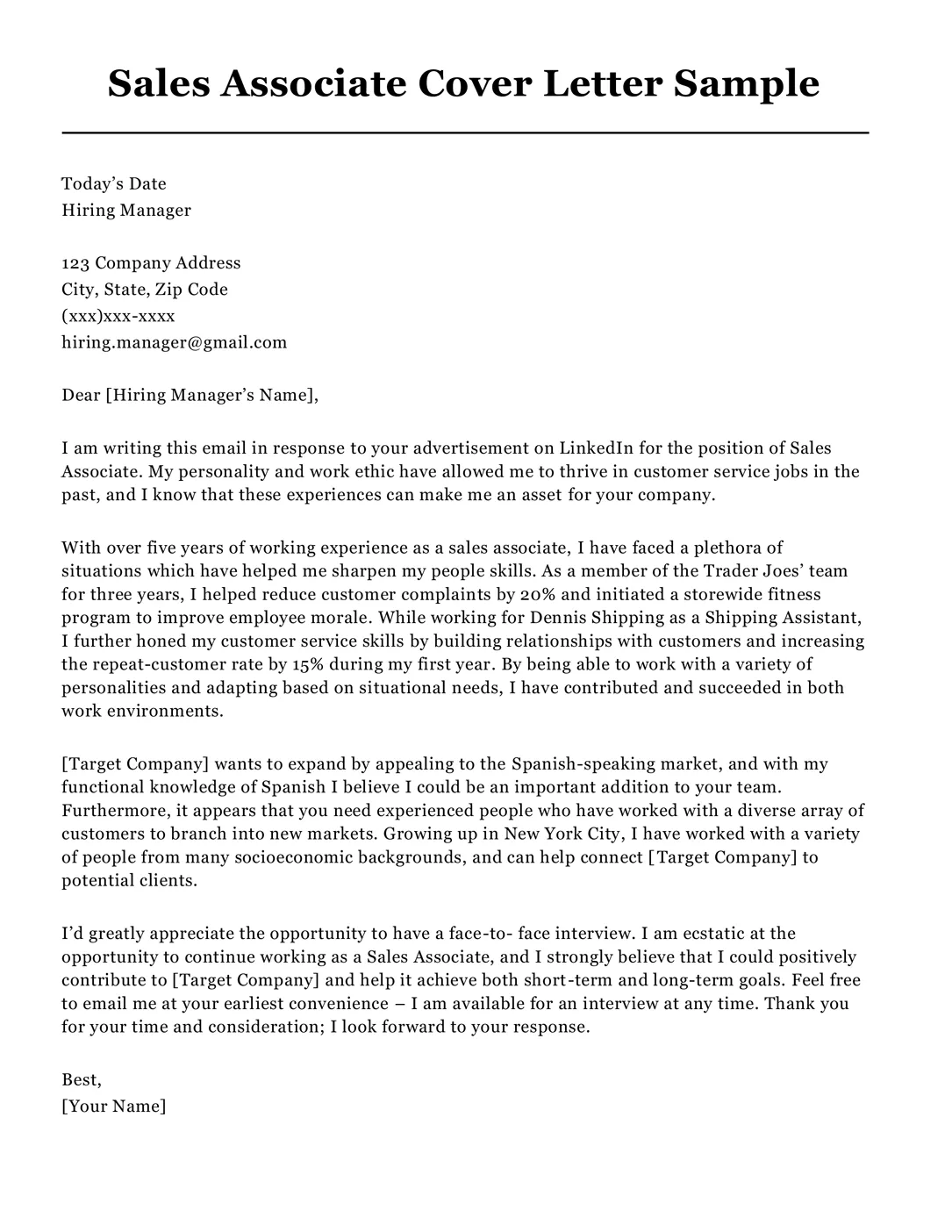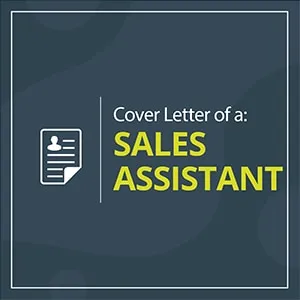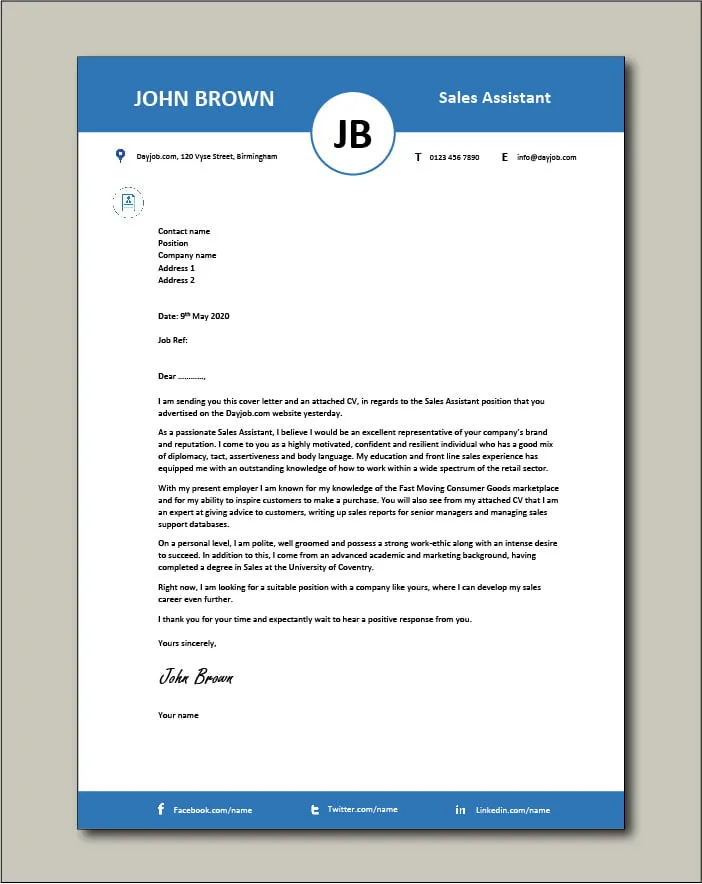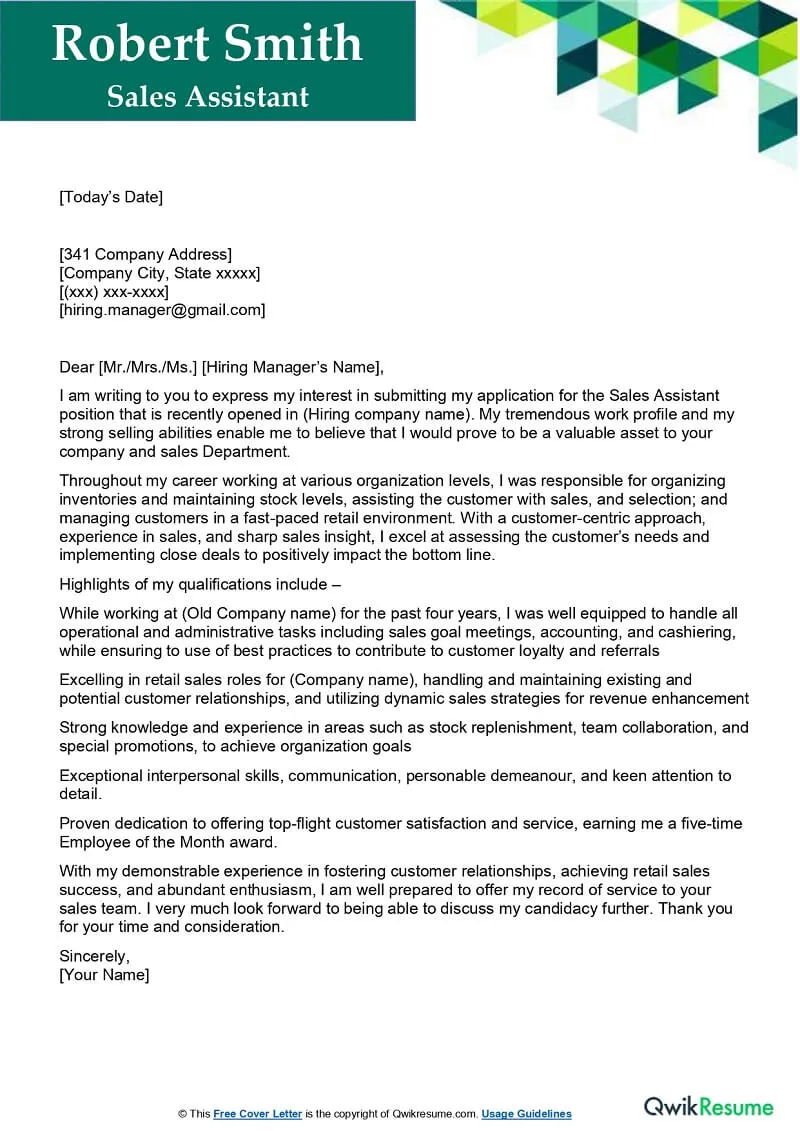Crafting a Sales Assistant Cover Letter that Stands Out
In the competitive job market, a well-crafted cover letter is your first opportunity to make a lasting impression on potential employers. For a Sales Assistant role, your cover letter isn’t just a formality; it’s a showcase of your skills, personality, and understanding of the sales environment. It should go beyond simply restating your resume. Instead, the cover letter should tell a compelling story that highlights your suitability for the position and your enthusiasm for the company. A strong cover letter immediately grabs the attention of hiring managers and encourages them to delve deeper into your qualifications and experience. Your goal is to transform a cover letter from a simple document into a powerful tool that separates you from other candidates and opens the door to an interview.
Highlighting Your Skills and Experience
Your cover letter needs to demonstrate a clear connection between your skills and the requirements of the Sales Assistant position. Instead of just listing your skills, provide specific examples of how you’ve used them to achieve results. For instance, rather than saying you possess ’excellent communication skills,’ describe a situation where you effectively communicated with a difficult client, resulting in a successful sale or positive outcome. Focus on relevant experiences, such as customer service roles, sales support, or any interactions that involved persuading, negotiating, or building relationships. Quantify your achievements whenever possible – ‘increased sales by 15% in six months’ is far more impactful than ‘improved sales performance’. Tailor each cover letter to the specific job description, ensuring that you address the key requirements and demonstrate how your skills align with the company’s needs.
Key Skills for a Sales Assistant Role

Sales Assistant roles demand a specific set of skills that contribute directly to the success of the sales team. These skills include excellent communication, both written and verbal, as you will be interacting with customers, preparing reports, and coordinating with colleagues. Proficiency in customer service is crucial for building and maintaining customer relationships. Strong organizational skills are essential for managing schedules, tracking leads, and handling administrative tasks. Adaptability is also important, as the sales environment is constantly changing. Problem-solving abilities allow you to address customer issues and overcome sales obstacles. A proactive and positive attitude will contribute to a pleasant work environment. Highlight these abilities in your cover letter and offer concrete examples. For instance, if a role emphasizes CRM software, provide details of the CRM tools you’ve used.
Proven Sales Techniques
Sales assistants often support the implementation of sales strategies, therefore showcasing your knowledge of effective sales techniques is essential. Demonstrate that you understand the principles of customer relationship management and the sales process. Briefly mention your experience with techniques like active listening, needs assessment, and objection handling. Illustrate your understanding of the sales funnel, from lead generation to closing the sale. Highlighting your familiarity with sales strategies and methodologies will immediately establish your credibility. Explain how you have employed these techniques in previous roles to achieve desired results. By illustrating a practical understanding of sales, you indicate your readiness to contribute to the sales team’s targets from day one.
Quantifiable Achievements
Numbers speak volumes when demonstrating your effectiveness in previous roles. Quantify your achievements in your cover letter to showcase your impact. Instead of saying, ‘Improved customer satisfaction,’ state, ‘Increased customer satisfaction scores by 20% through improved follow-up processes.’ If you exceeded sales targets, include the specific percentage or amount. Mention any successful campaigns you were involved in and their respective results. Quantifying your achievements makes your cover letter more compelling and shows hiring managers what you can bring to their team. It also showcases that you are not just taking part, but you are driven to perform. Be specific and provide measurable results that highlight your contributions and skills.
Tailoring Your Cover Letter to the Job

Generic cover letters are easily identified and often discarded. To impress, each cover letter should be tailored to the specific job and company. Review the job description thoroughly and identify the key requirements and keywords. Use these keywords throughout your cover letter to demonstrate that you understand the role and are a good fit. Research the company to understand their mission, values, and target audience. Mention specific aspects of the company that appeal to you and explain how your skills align with their goals. Customize your language and tone to match the company’s brand. If the company values innovation, for example, highlight your creative problem-solving abilities. By tailoring your cover letter, you showcase that you’ve taken the time to understand the position and are genuinely interested in the company.
Understanding the Company’s Needs
A successful cover letter shows an understanding of the company’s needs and the sales environment. Before writing, thoroughly research the company’s products, services, and target market. Identify any recent company initiatives or sales strategies that are relevant to the role. In your cover letter, demonstrate how your skills and experience align with these needs. For instance, if the company is expanding into a new market, mention any experience you have in that area. If they emphasize customer satisfaction, highlight your track record of building strong customer relationships. Showing that you understand the company’s challenges and how you can contribute to its success demonstrates your proactive approach and makes you a highly desirable candidate. Make sure that your skills, experience and attitude is aligned to the company’s culture and values.
Formatting and Structure Best Practices
The format and structure of your cover letter are just as important as its content. A well-formatted cover letter is easy to read and demonstrates professionalism. Use a clear and concise structure, with a professional font and appropriate margins. Begin with a strong opening paragraph that immediately grabs the reader’s attention. Follow with 2-3 body paragraphs that highlight your skills, experience, and achievements. Use bullet points to make key information stand out and make it easier for the hiring manager to scan. Keep each paragraph concise and focused. Ensure your letter is no more than one page in length. Use a professional closing statement that reiterates your interest in the position and expresses your enthusiasm for an interview. Correct formatting and structure show attention to detail and are essential for creating a positive first impression.
Tips for a Compelling Closing Statement

The closing statement is your final opportunity to leave a strong impression. Avoid generic phrases like ‘Thank you for your time and consideration.’ Instead, express your genuine interest in the position and reiterate your enthusiasm for the company. State your availability for an interview and clearly indicate how the hiring manager can contact you. If there is a specific aspect of the role or company that particularly excites you, mention it in your closing statement to add a personal touch. This demonstrates a genuine interest and passion for the opportunity. Conclude with a confident and positive tone, leaving the hiring manager with a lasting impression of your suitability and eagerness to join their team.
Proofreading and Editing Your Cover Letter
Errors in your cover letter can undermine your credibility. Before submitting your cover letter, proofread it carefully to catch any typos, grammatical errors, or inconsistencies. Read the cover letter aloud to identify awkward phrasing or sentences that do not flow well. Ask a friend, family member, or career counselor to review your cover letter and provide feedback. They can often spot errors that you might miss. Ensure that your formatting is consistent and that all information is accurate. A polished and error-free cover letter demonstrates your attention to detail and professionalism. Proper proofreading is critical to ensuring that your cover letter reflects your best qualities and makes a strong impression on potential employers. A well-edited and proofread cover letter is the final touch of quality.
